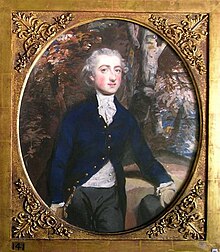Davies Davenport of Capesthorne Hall and Court Garden, Marlow (29 August 1757 — 5 February 1837) was a politician, soldier and landowner who served as Member of Parliament for Cheshire and High Sheriff of Cheshire.[1]
Davies Davenport MP | |
|---|---|
 portrait by Daniel Gardner | |
| Member of Parliament for Cheshire | |
| In office 1806–1830 | |
| Preceded by | William Egerton Thomas Cholmondeley |
| Succeeded by | The Viscount Belgrave Wilbraham Egerton |
| Personal details | |
| Born | 29 August 1757 |
| Died | 5 February 1837 (aged 79) |
| Spouse | Charlotte Sneyd |
| Parents |
|
| Education | Brasenose College, Oxford |
Early life edit
Davenport was born on 29 August 1757 to Davies Davenport of Capesthorpe and Phoebe Davenport of Calvely.[2] However, both of his parents died when he was still young and so was brought up by his uncle, Sir Thomas Davenport.[1] Lord Glenbervie described him as being educated as 'a pupil of J. J. Rousseau', he went on to Brasenose College, Oxford and was admitted into the Inner Temple in 1786.[3][4] He inherited his uncle's estates in 1810.[1]
Political career edit
Davenport stood as an unopposed Member of Parliament for Cheshire from the 1806 United Kingdom general election until the 1830 United Kingdom general election when he stood down.[5] Whilst Davenport was thought to be opposed to Abolitionism, he is not known to have voted against any of the abolitionist bills, he also voted against the bill proposing the ministerial pledge, however he was not supportive of Catholicism in general.[1] Although he generally voted against the government, he was seen as a friend of the Liverpool ministry although opposed to that of Portland.[1] He was however active in the committees on cotton and silk and was strictly against government interference.[1]
Family edit
In 1777 Davies married Charlotte, daughter of Ralph Sneyd of Keele Hall and Barbara Bagot, daughter of Sir Walter Bagot, 5th Baronet, they had several children:[2]
- Major Henry William Davenport, Major of the 87th Regiment, died 1834.
- Edward Davies Davenport of Capesthorne Hall (1778-1847), Member of Parliament for Shaftesbury, inherited Capesthorne from his father. His son Arthur Henry Davenport then inherited Capesthorne but died without issue.
- Ann Frances Davenport (1783-1854), married William Grant Rose, had issue.
- Rev. Walter Davenport Bromley of Capesthorne Hall (1787-1862), Vicar of Ellastone, father of William Bromley-Davenport who inherited Capesthorne from his cousin, Arthur Henry Davenport, son of Edward Davies Davenport, had issue.
- Harriet Catherine Davenport (born 1791), married Sir John Williams, a Judge and Member of Parliament.
Davenport died on 5 February 1837 and was succeeded by his son, Edward, his eldest, Henry having predeceased him.
References edit
- ^ a b c d e f R. Thorne, ed. (1986). "DAVENPORT, Davies (1757-1837), of Capesthorne Hall, Cheshire". The History of Parliament: the House of Commons 1790-1820 – via The History of Parliament Online.
- ^ a b Mosley, Charles (1965). Burke's Genealogical and Heraldic History of the Landed Gentry, 18th edition. 3 volumes; Volume 1. London, England: Burke's Peerage Ltd, 1965-1972. p. 190.
- ^ Douglas, Sylvester, Lord Glenbervie (1910). The Glenbervie Journals. London: Counstable. p. 123. ISBN 9781362460930.
{{cite book}}: CS1 maint: multiple names: authors list (link) - ^ Foster, Joseph (1888). Alumni oxonienses: the members of the University of Oxford, 1715-1886; their parentage, birthplace and year of birth, with a record of their degrees. Being the matriculation register of the University; Volume 1. Oxford: Parker. p. 341.
- ^ Stooks Smith, Henry. (1973) [1844-1850]. Craig, F. W. S. (ed.). The Parliaments of England (2nd ed.). Chichester: Parliamentary Research Services. p. 32. ISBN 0-900178-13-2.